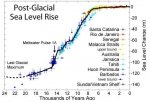Here is what I wrote, to which the above is supposed to be a response (with relevant bits bolded for ease of comparison):
The article claimed that if we don't reverse climate trends by the year 2000, it could (which I think should be read to mean "most likely will be the case that") be that the various areas it mentions (island nations, Egypt, Bangladesh) will suffer consequences (flooding, swamping, etc) at some time the article doesn't specify.
It's really as if you do not speak English, and are only playing an English speaker on television, or something. You keep talking about
what, as if I haven't been talking about
when. Clearly, if the prediction is that X will happen by time T, you cannot call the prediction false if X hasn't happened by T-N (that is, some time before T).
Here is quote from the article:
"Coastal regions will be inundated; one-sixth of Bangladesh could be flooded, displacing a fourth of its 90 million people. A fifth of Egypt’s arable land in the Nile Delta would be flooded, cutting off its food supply, according to a joint UNEP and U.S. Environmental Protection Agency study."
and also:
"Shifting climate patterns would bring back 1930s Dust Bowl conditions to Canadian and U.S. wheatlands, while the Soviet Union could reap bumper crops if it adapts its agriculture in time, according to a study by UNEP and the International Institute for Applied Systems Analysis."
So yes, it did say it. Is Egypt starving now? Have 22 million Bangladeshi people been displaced by flooding? Are there Dust Bowl conditions ion the US and Canada? Yes or no? Answer. These. Questions.
To answer your questions: Egypt is experiencing moderate hunger--that is, some Egyptians are starving, and they are dealing with increasing floods in areas that used not to be flood prone, though a fifth of the Nile Delta region has not yet been flooded. Dust Bowl conditions do not prevail in the US and Canada. 22 million people in Bangladesh have not been displaced by flooding--so far it's only up to 7 million who have been displaced by permanent flooding so far.
Now answer my question: where in the article does it say that all of this was supposed to have happened by 2019? No, nevermind, don't answer that, because I doubt you will anyway, and anyone who can read can see that the article says so nowhere. You're straw-manning what the article says and then knocking that straw man down and crowing that you've won.
Looking a little deeper into the article, it appears to be not based on any one study, but rather, a range of them developed by UNEP. You can go here to find a large number of them:
Knowledge Repository
Searching for documents from 1989 that are archived at the above link, the earliest date for some predictions is 2025 (for a 7-inch sea-level rise along the gulf coast and in the Caribbean). Most of the projected dates are between 2050 and 2100, so we've still got a bit to go. However, as links I've posted previously show, the earliest indicators from those scenarios have already started happening. Just to focus on Bangladesh for a moment: again, no 22 million people have not been displaced. But that number isn't apparently predicted to be the case until 2100. So far, over the last decade, about 7 million have been displaced:
Climate change creates a new migration crisis for Bangladesh
So we are well on track for there to be 22 million (or perhaps far more) by 2100.
So here's another example conversation that may be closer to what you're trying to do:
You: I should have a three million dollar retirement account by 2040.
Me: No way! You don't have three million dollars!
You: No, I mean I'll likely have three million dollars in two decades.
Me: You don't have three million dollars! You're a damn liar! Your lies are exposed! Ha!
Again, if that exchange were to take place, I'd obviously be quite foolish. But you're making the same error I would be making. You're just not paying attention to what the claim actually is, substituting your own version, and then trying to sell your version as the one that UNEP made. Again, if that's what you have to do to convince yourself that you're "winning" then you should examine your thinking much more carefully.

